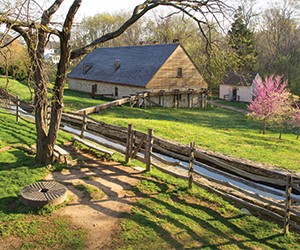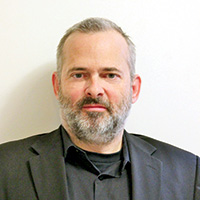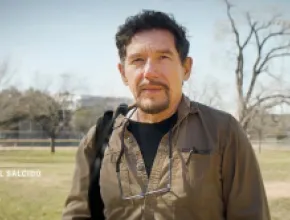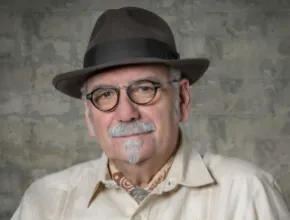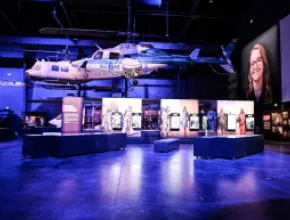In Virginia, according to the state’s Department of Historic Resources, historic places and sites collectively “define this place we call Virginia, and us as Virginians.” Preserving and repurposing historic places, notes the agency, serves “both as a major tool for urban renewal and as a key element of the state’s multibillion-dollar tourism industry.”
Established in 1965, Richmond-based Glave & Holmes Architecture (G&HA) is a highly acclaimed firm with a major presence in the cultural, higher education, hospitality and events markets, among others. Adaptive reuse projects are a specialty, including esteemed meeting venues such as the Colonial Williamsburg Lodge & Conference Center and The Valentine history museum in Richmond.
G&HA believes that “great architecture is contextual, timeless and has the capacity to engage the intellect and elevate the human spirit.” Those same qualities define superior meeting programs, which makes selecting Virginia’s many repurposed heritage properties a reliable blueprint for memorable and inspiring gatherings.
Northern Virginia
Formed in 1742, Fairfax County is headquarters of America’s most visited historic home, George Washington’s Mount Vernon. Updated event spaces at the landmark estate include The Ford Orientation Center and the Donald W. Reynolds Museum and Education Center, where 20-plus galleries and theaters interactively present Washington’s life. Fully functional and event-capable, the reconstructed Distillery and Gristmill provides an authentic taste of whiskey, one of Washington’s most profitable business endeavors.
In southern Fairfax County, the Workhouse Arts Center, founded in 1910 as the Occoquan Workhouse for non-violent criminals, has a truly arresting history.
In 1917, there were 72 women incarcerated here for protests advocating for women’s right to vote. Their efforts culminated in November 1917 with a group of suffragists being imprisoned for picketing outside of the White House. Their “Night of Terror” catalyzed passage of the 19th Amendment, giving women the right to vote.
Closed in 2001, the facility was reborn in 2008 as the Workhouse Arts Center following extensive rehabilitation. Home to artists in residence and exhibitors, this quadrangular working arts studio features a small museum and various performance, meeting and event spaces.
Covering 225 acres adjacent to Manassas Battlefield Park, The Winery at Bull Run is another unique Fairfax County echo of the past. Event spaces include the Hillwood Ruins, the stone foundation and chimney of a historic house salvaged to preserve the site’s 1800s character.
Alexandria’s waterfront Torpedo Factory Art Center (TFAC) was originally a WWI torpedo factory. In 1974, following post-WWII service as a warehouse for dinosaur bones, German war films and more, artists converted the complex into studios. Today, TFAC offers an industrial-chic canvas for events and functions.
In pastoral Middleburg, 40 miles west of D.C., Salamander Resort & Spa celebrates its fifth anniversary this year as the flagship of founder and CEO Sheila C. Johnson’s growing collection of luxurious Salamander Hotels & Resorts properties. Set on 340 acres, this 168-room group magnet, renowned for its equestrian programs, offers versatile spaces ranging from luxurious ballrooms to outdoor function areas such as the Culinary Gardens.
The original property’s one existing structure, a century-plus-old stallion barn, was repurposed as a private event venue. Located adjacent to the event-capable Grand Lawn, the Stallion Barn was recently refurbished using every piece of white pine from the original structure. The 24-capacity stone structure features rustic-inspired furnishings amid 12-foot ceilings and exposed brick walls.
Central Virginia
Richmond’s architectural diversity includes Agecroft Hall, a 16th century Tudor manor house transported from England in 1926 and reassembled on a James River estate. Host site for the annual Richmond Shakespeare Festival, Agecroft Hall & Gardens offers the 90-capacity William’s Room for nonprofit groups.
Opened in 1898, the Valentine Richmond History Center relaunched in 2014 as The Valentine after a multimillion-dollar G&HA-led renovation. Incorporating four heritage buildings including the landmark Wickham House (1812), Richmond’s beloved history museum offers versatile spaces and some 350 guided history tours.
Updating the iconic century-old Miller & Rhoads department store, the 250-room Hilton Richmond Downtown offers 10,000 square feet of versatile space in the convention district. Housed in a former 1916 luxury department store, the Quirk Hotel features original wooden beams repurposed as furniture. The event-capable Science Museum of Virginia revived the former Broad Street Station, an architectural landmark from 1919.
In Charlottesville, G&HA’s restoration of the Robert H. Smith Center at Montalto, Thomas Jefferson’s “high mountain” overlooking Monticello, added meeting space and accommodations for visiting dignitaries to the 1903 hilltop property. G&HA also created flexible new meeting rooms and exhibit spaces at the University of Virginia’s historic Rotunda.
Coastal Virginia
Forming “America’s Historic Triangle” with Jamestown and Yorktown, Williamsburg is a group destination for the ages. Operated by the Colonial Williamsburg Foundation, this former 18th century capital city, Britain’s preeminent outpost of the time, is the world’s largest living-history museum.
Incorporating six hotels and resorts, meticulously restored colonial buildings, off-site programming and more, Colonial Williamsburg collectively offers 67,000 square feet of versatile conferencing and function space, plus outdoor venues, for all group sizes and budgets. Highlights include the historic 62-room, AAA Five Diamond Williamsburg Inn, with event spaces including the restored 18th century Providence Hall House.
G&HA’s collaborative update of the 1938 Colonial Williamsburg Lodge included 323 guest rooms and a new conference center featuring a 12,000-square-foot ballroom and other spaces.
Virginia Beach groups have the 1927 Cavalier Hotel. Newly reopened following an extensive $75 million renovation, this 85-room Autograph Collection gem offers 4,721 square feet of oceanfront space for 20 to 125 guests.
Western Virginia
In 1927, New Jersey record executive Ralph Peer went to Bristol, straddling the Virginia-Tennessee border, to seek out performers of the region’s southern Appalachian “hillbilly” sound. His recordings would change history as the foundation for country music.
In 1998, Congress officially recognized Bristol as the Birthplace of Country Music, followed by the 2014 opening of the Birthplace of Country Music Museum. Housed in a former 1920 automobile facility, this Smithsonian-affiliated venue offers individual rental spaces and full buyouts.
Slated to open this fall across the street, the new 65-room Bristol Hotel updates the landmark Reynolds Arcade from 1925 with 3,000 square feet of flexible space including several historic ballrooms and a rooftop bar with sweeping Appalachian Mountain views.
Housed in a Norfolk & Western Railway freight station, the Virginia Museum of Transportation in Roanoke flexibly hosts large-scale events amid vintage train and aviation exhibits. Repurposing the ruins of a historic lime kiln and quarry, Lexington’s outdoor Lime Kiln Theater flexibly hosts outdoor and tented events for up to 1,000 people.
PageBreakOn the Scene: Lynchburg, Virginia
Exploring the “City of Opportunity”
Founded by John Lynch in 1757 as a James River ferry crossing, Lynchburg, Va., with its rail and river links, later prospered in tobacco, trade, manufacturing and banking. By the early 20th century, it was the nation’s wealthiest city of its size. Described by Thomas Jefferson as “the most interesting spot in Virginia,” Lynchburg has since reemerged as a vibrant regional economic center driven by finance, engineering, healthcare, technology and education.
Forbes has recognized this self-billed “City of Opportunity” for its favorable business climate. Liberty University is one of six area higher learning institutions supplying the city with intellectual vigor. Passing freight trains provide a nostalgic soundtrack to the past. And the adaptive reuse of downtown’s ghost-lettered former warehouses, factories and other buildings creates an atmospheric landscape of discovery.
In its heyday, the Craddock Terry Shoe Company (1888) was the world’s fifth largest shoe factory. In 2007, the factory’s Southland Annex and adjoining restored 1896 tobacco warehouse were reborn as the boutique 44-room Craddock Terry Hotel and Event Center. Newly renovated spaces include the 200-capacity Granite Hall and scenic 100-capacity Riverside Foyer. Plus, private dining rooms in the upscale Shoemaker’s and casual Waterstone restaurants.
“Our core group business includes corporate and state association meetings,” said Director of Sales Kimberly Wolf, who also introduced the hotel’s new official canine greeter, Penny Loafer. As with her recently retired predecessor Buster Brown, guests can take this adorable wirehaired fox terrier puppy for walks.
You’ll need sturdy shoes to explore the “City of Seven Hills” and its steep streets, where the 1913 Virginian Hotel is another updated heirloom. Relaunched in May 2018 as the 115-room Virginian Lynchburg, this Hilton Curio Collection property offers 8,000-plus square feet of space, including the elegantly restored Ballroom.
Lined with war memorials, nearby Monument Terrace rises 139 steps to Church Street and the Lynchburg Museum, housed in an 1855 Greek Revival court house. Group dining options include riverfront-based The Depot Grille, housed in the memorabilia-filled update of a historic freight depot.
Featuring five small museums, the 1809 Old City Cemetery is Lynchburg’s most visited historic site, while memorable walks await on the three-mile urban Blackwater Creek Trail, which passes through a former rail tunnel from 1852.
VIRGINIA CVB INFORMATION
NORTHERN VIRGINIA
Arlington Convention and Visitors Service
703.228.0873
Greater Fredericksburg Tourism Partnership
540.372.1216
Loudoun Convention & Visitors Association
703.771.2170
Discover Prince William and Manassas
703.396.7130
Visit Alexandria
703.652.5360
Visit Fairfax
703.790.0643
CENTRAL VIRGINIA
Charlottesville Albemarle CVB
434.293.6789
City of Danville
434.799.5200
City of Lynchburg
Office of Economic Development and Tourism
434.485.7290
Richmond Region Tourism
804.783.7450
COASTAL VIRGINIA
Chesapeake Parks, Recreation and Tourism
757.382.6411
City of Portsmouth
757.393.5111
Hampton CVB
757.722.1222
Newport News Tourism
757.886.7777
Suffolk Division of Tourism
757.514.4130
Virginia Beach CVB
757.385.4700
VisitNorfolk
757.664.6620
Williamsburg Destination Marketing Committee
757.229.6511
WESTERN VIRGINIA
Abingdon CVB
276.676.2282
Bristol CVB
423.989.4850
Montgomery County COC
540.382.3020
Lexington & the Rockbridge Area Tourism
540.463.3777
Visit Virginia's Blue Ridge
540.342.6025



